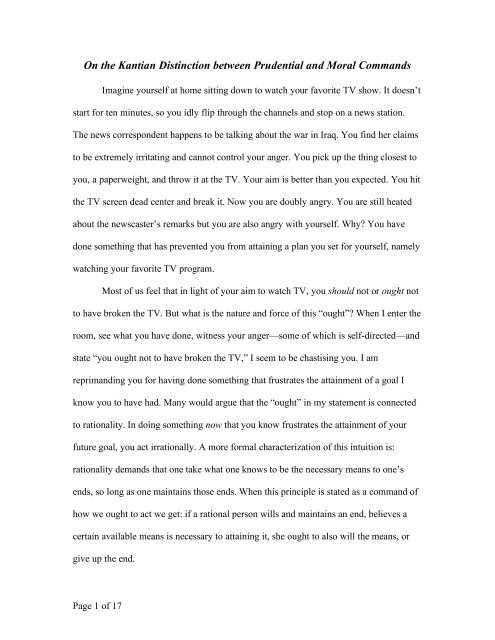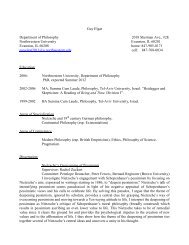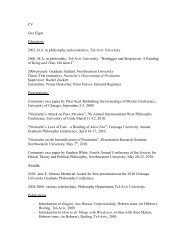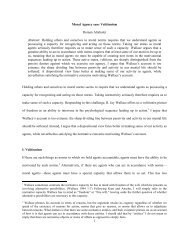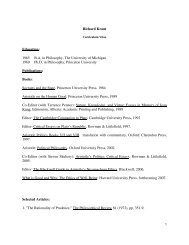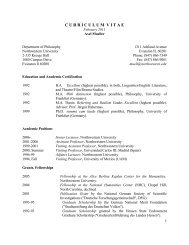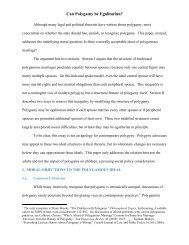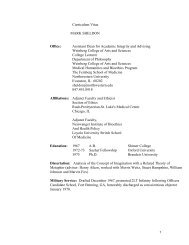On the Kantian Distinction between Prudential and Moral Commands
On the Kantian Distinction between Prudential and Moral Commands
On the Kantian Distinction between Prudential and Moral Commands
Create successful ePaper yourself
Turn your PDF publications into a flip-book with our unique Google optimized e-Paper software.
<strong>On</strong> <strong>the</strong> <strong>Kantian</strong> <strong>Distinction</strong> <strong>between</strong> <strong>Prudential</strong> <strong>and</strong> <strong>Moral</strong> Comm<strong>and</strong>s<br />
Imagine yourself at home sitting down to watch your favorite TV show. It doesn’t<br />
start for ten minutes, so you idly flip through <strong>the</strong> channels <strong>and</strong> stop on a news station.<br />
The news correspondent happens to be talking about <strong>the</strong> war in Iraq. You find her claims<br />
to be extremely irritating <strong>and</strong> cannot control your anger. You pick up <strong>the</strong> thing closest to<br />
you, a paperweight, <strong>and</strong> throw it at <strong>the</strong> TV. Your aim is better than you expected. You hit<br />
<strong>the</strong> TV screen dead center <strong>and</strong> break it. Now you are doubly angry. You are still heated<br />
about <strong>the</strong> newscaster’s remarks but you are also angry with yourself. Why? You have<br />
done something that has prevented you from attaining a plan you set for yourself, namely<br />
watching your favorite TV program.<br />
Most of us feel that in light of your aim to watch TV, you should not or ought not<br />
to have broken <strong>the</strong> TV. But what is <strong>the</strong> nature <strong>and</strong> force of this “ought”? When I enter <strong>the</strong><br />
room, see what you have done, witness your anger—some of which is self-directed—<strong>and</strong><br />
state “you ought not to have broken <strong>the</strong> TV,” I seem to be chastising you. I am<br />
reprim<strong>and</strong>ing you for having done something that frustrates <strong>the</strong> attainment of a goal I<br />
know you to have had. Many would argue that <strong>the</strong> “ought” in my statement is connected<br />
to rationality. In doing something now that you know frustrates <strong>the</strong> attainment of your<br />
future goal, you act irrationally. A more formal characterization of this intuition is:<br />
rationality dem<strong>and</strong>s that one take what one knows to be <strong>the</strong> necessary means to one’s<br />
ends, so long as one maintains those ends. When this principle is stated as a comm<strong>and</strong> of<br />
how we ought to act we get: if a rational person wills <strong>and</strong> maintains an end, believes a<br />
certain available means is necessary to attaining it, she ought to also will <strong>the</strong> means, or<br />
give up <strong>the</strong> end.<br />
Page 1 of 17
Throughout this paper I will refer to this comm<strong>and</strong> as The Hypo<strong>the</strong>tical<br />
Imperative. 1 I aim to establish <strong>the</strong> following three claims regarding this principle. First, I<br />
argue that The Hypo<strong>the</strong>tical Imperative is, itself, a categorical comm<strong>and</strong> of reason.<br />
Second, one of <strong>the</strong> implications of <strong>the</strong> fact that The Hypo<strong>the</strong>tical Imperative is<br />
categorically binding is that <strong>the</strong> <strong>Kantian</strong> way of distinguishing prudential from moral<br />
obligations fails. Finally, I consider three especially promising proposals for responding<br />
to <strong>the</strong> problem, but argue that <strong>the</strong>y each fail.<br />
§ I. The Significance of Differentiating <strong>Prudential</strong> from <strong>Moral</strong> Requirements<br />
Non-philosophers <strong>and</strong> philosophers alike take <strong>the</strong>re to be two distinct classes of<br />
reasons: moral <strong>and</strong> prudential. If it is <strong>the</strong> case that mocking someone for fun is immoral,<br />
<strong>the</strong>n I have a moral reason not to do so. In contrast, I have a prudential reason to maintain<br />
my health, if I plan to live a long life with most of my faculties intact. This is not to say,<br />
however, that <strong>the</strong> reasons that recommend an action must be ei<strong>the</strong>r moral or prudential.<br />
In fact, <strong>the</strong> recommendations of morality <strong>and</strong> prudence often coincide. As Kant famously<br />
claims, a shopkeeper has both moral <strong>and</strong> prudential reasons to refrain from cheating her<br />
customers. 2<br />
Despite <strong>the</strong> fact that morality <strong>and</strong> prudence often recommend <strong>the</strong> same course of<br />
action, <strong>the</strong>re seems to be a fundamental difference <strong>between</strong> <strong>the</strong>se classes of reasons.<br />
There are a number of factors to which we can point in support of this pre-<strong>the</strong>oretical<br />
intuition. First, <strong>the</strong> recommendations of morality <strong>and</strong> prudence can give conflicting<br />
1 I’m following Thomas E. Hill, Jr. in calling this principle The Hypo<strong>the</strong>tical Imperative. See his book,<br />
Dignity <strong>and</strong> Practical Reason (Cornell University Press, 1992), chapter I, “The Hypo<strong>the</strong>tical Imperative,”<br />
for an in-depth discussion of this principle.<br />
2 Kant, Groundwork for <strong>the</strong> Metaphysics of <strong>Moral</strong>s, Hill, Thomas E. Jr. <strong>and</strong> Arnulf Zweig trans. <strong>and</strong> eds.<br />
(Oxford, N.Y.: Oxford University Press, 2002), p. 199, [4: 397].<br />
Page 2 of 17
advice, <strong>and</strong> when <strong>the</strong>y do, <strong>the</strong> claims of morality are thought to trump <strong>the</strong> dem<strong>and</strong>s of<br />
prudence. Second, even when one has both moral <strong>and</strong> prudential reasons to act in a<br />
particular way, <strong>Kantian</strong>s, at least, claim (1) that we have a choice about which of <strong>the</strong><br />
reasons we act on, <strong>and</strong> (2) that our choice of which reasons we act on is a matter of some<br />
moral importance.<br />
Finally, <strong>the</strong> distinctness of <strong>the</strong>se two classes of reasons is manifested by <strong>the</strong><br />
different attitudes we take towards immoral <strong>and</strong> imprudent actions. Most of us are no<br />
stranger to <strong>the</strong> shame that accompanies acting foolishly. We procrastinate, for instance,<br />
seeking to satisfy our (often urgently felt) short-term desires, even when we believe that<br />
doing so jeopardizes our long-term goals. Just as when we act immorally, when we act<br />
imprudently we reprim<strong>and</strong> ourselves. We do not advertise that we sometimes act<br />
carelessly or rashly nor do we take pride in having so acted. We often console ourselves<br />
by stating our intention to change <strong>and</strong> trying to rectify <strong>the</strong> situation. We declare that next<br />
year will be different. This is <strong>the</strong> stuff of New Year’s resolutions.<br />
Although we scold o<strong>the</strong>rs <strong>and</strong> ourselves for acting imprudently, this kind of<br />
censure is thought to be at least of a different degree <strong>and</strong> possibly even of a different kind<br />
than <strong>the</strong> disapproval we justifiably feel when we believe that we or someone else has<br />
acted immorally. In violating prudential obligations, we typically are not, <strong>and</strong> feel we<br />
ought not to be subject to <strong>the</strong> kind of criticism we are rightly subject to when we violate<br />
moral obligations. We do not, generally speaking, take someone to be morally culpable<br />
for destroying her TV <strong>and</strong> <strong>the</strong>reby frustrating her intention to watch her favorite program.<br />
This distinction <strong>between</strong> immoral <strong>and</strong> imprudent behavior is a valuable feature of<br />
our everyday discourse. Hence, any moral <strong>the</strong>ory ought to be able to: (1) provide a<br />
Page 3 of 17
philosophical basis for <strong>the</strong> difference <strong>between</strong> moral <strong>and</strong> prudential reasons; (2) explain<br />
why moral reasons trump prudential ones; <strong>and</strong> (3) give an analysis of why imprudent<br />
actions are not <strong>and</strong> are rightly thought not to be as “bad” as immoral ones. 3<br />
Moreover, a generally received view is that one advantage of Kant’s moral <strong>the</strong>ory<br />
<strong>and</strong> his <strong>the</strong>ory as <strong>Kantian</strong>s have developed it, is that it provides a principled basis for this<br />
distinction. <strong>Kantian</strong>s <strong>and</strong> non-<strong>Kantian</strong>s alike maintain that <strong>the</strong> difference <strong>between</strong> moral<br />
<strong>and</strong> prudential requirements lies in <strong>the</strong>ir “categoricity.” <strong>Moral</strong> comm<strong>and</strong>s, it is argued,<br />
differ from prudential ones in that <strong>the</strong> former are categorical while <strong>the</strong> later are (merely)<br />
hypo<strong>the</strong>tical. However, if The Hypo<strong>the</strong>tical Imperative—<strong>the</strong> fundamental principle of<br />
means-ends reasoning—is a categorical imperative, we must rethink what <strong>the</strong> difference<br />
<strong>between</strong> a moral <strong>and</strong> prudential obligation consists in. 4<br />
§ II: Categoricity is not <strong>the</strong> Sole Mark of <strong>the</strong> <strong>Moral</strong><br />
In Section II of <strong>the</strong> Groundwork for <strong>the</strong> Metaphysics of <strong>Moral</strong>s, 5 Kant claims that<br />
<strong>the</strong>re are two kinds of imperatives of reason: hypo<strong>the</strong>tical <strong>and</strong> categorical. According to<br />
Kant <strong>and</strong> many <strong>Kantian</strong>s, <strong>the</strong> crucial difference <strong>between</strong> hypo<strong>the</strong>tical <strong>and</strong> categorical<br />
imperatives is that <strong>the</strong> former, but not <strong>the</strong> later, depend on rationally revisable ends.<br />
3 I have, perhaps, stated <strong>the</strong> claim of what any moral <strong>the</strong>ory must do too strongly. I do not mean to assume<br />
that moral reasons always trump non-moral reasons or that moral infractions are always worse than nonmoral<br />
ones. I think a moral <strong>the</strong>ory that argued that moral reasons do not always trump o<strong>the</strong>r reasons is a<br />
live possibility. All that I intend for <strong>the</strong> moment is <strong>the</strong> idea that a moral <strong>the</strong>ory would need to explain why<br />
we take <strong>the</strong>re to be a significant difference <strong>between</strong> or moral <strong>and</strong> non-moral reasons for action.<br />
4 At this point, one might reasonably wonder about <strong>the</strong> connection <strong>between</strong> The Hypo<strong>the</strong>tical Imperative<br />
<strong>and</strong> prudence. To act imprudently, it is commonly thought, is to act against one’s own long-term selfinterest.<br />
In contrast, a violation of The Hypo<strong>the</strong>tical Imperative involves acting against an end that one sets<br />
<strong>and</strong> maintains. And, because rational agents are capable of setting goals that have no direct connection to<br />
one’s self-interest, one can act contrary to an instrumental reason she has but not, <strong>the</strong>reby, act imprudently.<br />
Still, one’s instrumental reasons <strong>and</strong> <strong>the</strong> reasons offered by prudence will coincide when it is <strong>the</strong> case that<br />
<strong>the</strong> agent sets her own long-term self-interest as an end. <strong>On</strong> my reading of Kant, prudential reasons are a<br />
sub-set of instrumental reasons.<br />
5 Kant, Groundwork for <strong>the</strong> Metaphysics of <strong>Moral</strong>s, Hill, Thomas E. Jr. <strong>and</strong> Arnulf Zweig trans. <strong>and</strong> eds.<br />
(Oxford, N.Y.: Oxford University Press, 2002), pp. 215-221, [4: 413 – 420].<br />
Page 4 of 17
Hypo<strong>the</strong>tical imperatives dem<strong>and</strong> a certain action in light of <strong>the</strong> agent having set for<br />
herself <strong>the</strong> attainment of some rationally contingent purpose. Hence, an agent can escape<br />
or get out of a particular hypo<strong>the</strong>tical prescription by giving up or changing her ends. It<br />
seems that this is importantly not <strong>the</strong> case with moral, that is, categorical imperatives. For<br />
instance, my prescription that you take <strong>the</strong> J bus in order to be home in 15 minutes is<br />
withdrawn (or ceases to be valid) if you are not headed home. Conversely, when I claim<br />
that you should not make fun of ano<strong>the</strong>r person for sport, I do not withdraw this<br />
prescription upon learning that doing so is a necessary means to one of your ends. A<br />
moral prescription, it is thought, cannot be “gotten out of” or escaped by a change in <strong>the</strong><br />
rationally contingent ends of those bound by it.<br />
To forestall potential confusion, let me explain why a commonly held view of <strong>the</strong><br />
difference <strong>between</strong> hypo<strong>the</strong>tical <strong>and</strong> categorical imperatives is mistaken. Some have<br />
argued that <strong>the</strong> grammatical form of an imperative is an accurate indicator of <strong>the</strong> type of<br />
imperative it is. The form of a fully specified hypo<strong>the</strong>tical imperative, according to this<br />
view, is, “If or when one seeks end E, one ought to do action A.” In contrast, <strong>the</strong> typical<br />
form of a categorical imperative would be simply, “<strong>On</strong>e ought to do action A.”<br />
This view is mistaken for a number of reasons. 6 The one that concerns us,<br />
however, is <strong>the</strong> fact that moral requirements may take a conditional form. The terms<br />
“hypo<strong>the</strong>tical” <strong>and</strong> “categorical” qualify (only) <strong>the</strong> necessity that <strong>the</strong> statement attributes<br />
to <strong>the</strong> doing of a given action. In a categorical requirement <strong>the</strong>re is nothing to prevent <strong>the</strong><br />
action itself (as distinct from <strong>the</strong> necessity to do <strong>the</strong> act) from being specified by <strong>the</strong> use<br />
of a conditional “if” or “when”. A categorical imperative may be of <strong>the</strong> form “if or when<br />
6 For a detailed discussion of this issue see Thomas E. Hill, Jr., “The Hypo<strong>the</strong>tical Imperative,” pp. 26-32,<br />
<strong>and</strong> John McDowell’s “Are <strong>Moral</strong> Requirements Hypo<strong>the</strong>tical Imperatives?”, Proceedings of <strong>the</strong><br />
Aristotelian Society, 1978.<br />
Page 5 of 17
in circumstances C, one must do action A.” Should an agent find herself in <strong>the</strong> specified<br />
circumstances, she must do A, even though not every rational agent need find herself in<br />
those circumstances.<br />
A. The Hypo<strong>the</strong>tical Imperative<br />
The focus of this paper is not particular hypo<strong>the</strong>tical imperatives, of which <strong>the</strong>re<br />
are many, but ra<strong>the</strong>r The Hypo<strong>the</strong>tical Imperative. The Hypo<strong>the</strong>tical Imperative is a<br />
prescriptive statement about how rational beings must act. It adjures us to take what we<br />
know to be <strong>the</strong> necessary <strong>and</strong> available means to our ends or else give up those ends.<br />
Kant never explicitly states The Hypo<strong>the</strong>tical Imperative, though he hints at it. 7<br />
Never<strong>the</strong>less, it seems some principle like The Hypo<strong>the</strong>tical Imperative is needed to<br />
ground particular hypo<strong>the</strong>tical imperatives. 8 Let me briefly explain my reason for<br />
thinking The Hypo<strong>the</strong>tical Imperative is, indeed, a categorical one.<br />
The feature that distinguishes a categorical from a hypo<strong>the</strong>tical imperative is that<br />
a categorical imperative comm<strong>and</strong>s a certain course of conduct independently of any<br />
o<strong>the</strong>r purposes, goals, or ends <strong>the</strong> agent has. The Hypo<strong>the</strong>tical Imperative tells us that we<br />
ought to take <strong>the</strong> necessary means to our ends or give <strong>the</strong>m up. Now this imperative is<br />
binding on us insofar as we are rational agents, regardless of whe<strong>the</strong>r or not we want,<br />
desire, or have an inclination to comply with it. The Hypo<strong>the</strong>tical Imperative does not,<br />
like particular hypo<strong>the</strong>tical imperatives, declare an action to be rationally necessary in<br />
7 Consider Kant’s claim that “<strong>the</strong> imperative that comm<strong>and</strong>s him who wills <strong>the</strong> end to will <strong>the</strong> means….is<br />
analytic”, Kant, Groundwork for <strong>the</strong> Metaphysics of <strong>Moral</strong>s, Hill, Thomas E. Jr. <strong>and</strong> Arnulf Zweig trans.<br />
<strong>and</strong> eds. (Oxford, N.Y.: Oxford University Press, 2002), p. 220 [4: 419].<br />
8 I am not arguing that postulating something like The Hypo<strong>the</strong>tical Imperative as a principle of reason is<br />
<strong>the</strong> only or <strong>the</strong> best response to <strong>the</strong> question of what grounds particular instrumental prescriptions. My<br />
argument is more modest. I claim only that such a principle is a presupposition of Kant’s claims regarding<br />
particular hypo<strong>the</strong>tical imperatives.<br />
Page 6 of 17
light of it being a necessary means to an end we have set. It is not in virtue of having a<br />
desire to abide by The Hypo<strong>the</strong>tical Imperative that it is a comm<strong>and</strong> of reason. Perhaps<br />
surprisingly, being bound by The Hypo<strong>the</strong>tical Imperative does not depend on desiring to<br />
promote our projects, fulfill our goals, or lead an effective, productive life, even though<br />
we may have such a desire. The Hypo<strong>the</strong>tical Imperative cannot be gotten out of by a<br />
change in an agent’s rationally contingent ends.<br />
I am not, however, suggesting that <strong>the</strong>re is no difference <strong>between</strong> The<br />
Hypo<strong>the</strong>tical Imperative <strong>and</strong> what is commonly referred to as The Categorical<br />
Imperative, just that what distinguishes <strong>the</strong>m cannot be that one is categorical while <strong>the</strong><br />
o<strong>the</strong>r is not. The Hypo<strong>the</strong>tical Imperative is an unconditional comm<strong>and</strong> of reason. It does<br />
not depend on what an agent counts as essential to his or her happiness. The only way to<br />
not be subject to The Hypo<strong>the</strong>tical Imperative is to have no ends whatsoever, which is not<br />
possible for a rational being. 9 Its force cannot be withdrawn by giving up some particular<br />
end. Ra<strong>the</strong>r, a rational being is bound by it independent of <strong>the</strong> content of her ends.<br />
B. The Hypo<strong>the</strong>tical Imperative is not a <strong>Moral</strong> Principle<br />
If my reasoning to this point has been sound, I have shown that The Hypo<strong>the</strong>tical<br />
Imperative is a categorical comm<strong>and</strong>. But this is only half of what I need in order to<br />
establish my <strong>the</strong>sis that comm<strong>and</strong>ing categorically is not a sufficient condition for being a<br />
moral dem<strong>and</strong>. This conclusion follows only if The Hypo<strong>the</strong>tical Imperative is not a<br />
moral one. I provide two arguments in support of this conclusion.<br />
First, if an agent followed only by The Hypo<strong>the</strong>tical Imperative she would not<br />
necessarily act morally. There is no inconsistency in someone recognizing <strong>the</strong> rationality<br />
9 A rational agent is, by definition, a being that acts purposefully—for <strong>the</strong> sake of some end.<br />
Page 7 of 17
of always taking <strong>the</strong> necessary means to her ends (or ab<strong>and</strong>oning her ends) <strong>and</strong> acting in<br />
light of this recognition, but, never<strong>the</strong>less, acting immorally. 10 More importantly,<br />
however, if all categorical imperatives, including The Hypo<strong>the</strong>tical Imperative, are moral,<br />
we are forced to accept a counterintuitive claim. If The Hypo<strong>the</strong>tical Imperative is a<br />
moral imperative, <strong>the</strong>n we would be morally culpable for failing to take <strong>the</strong> necessary<br />
means to our ends, while maintaining our ends. I began with <strong>the</strong> suggestion that most of<br />
us are familiar with imprudent or instrumentally irrational acts <strong>and</strong> not proud of ourselves<br />
when we commit <strong>the</strong>m, but we, never<strong>the</strong>less, view imprudent acts as less problematic<br />
than immoral ones. We do not think we deserve as much, <strong>and</strong> possibly not even <strong>the</strong> same<br />
kind of censure that we take ourselves to be rightly subject to when we commit an<br />
immoral act. If we insist that The Hypo<strong>the</strong>tical Imperative is a moral principle—in virtue<br />
of its categoricity—Kant <strong>and</strong> <strong>Kantian</strong>s lose this distinction.<br />
Why so? Whatever problems <strong>the</strong>re are with violating one categorical imperative,<br />
in virtue of it being a categorical imperative, should follow from violating any categorical<br />
imperative. That is, when I tell a self-interested lie or break a promise, I am subject to<br />
certain reprim<strong>and</strong>s, from myself <strong>and</strong> o<strong>the</strong>rs, because I violated a categorical comm<strong>and</strong> of<br />
rationality, namely The Categorical Imperative. So, in violating any o<strong>the</strong>r categorical<br />
imperative, like The Hypo<strong>the</strong>tical Imperative, <strong>Kantian</strong>s must, on pain of inconsistency,<br />
maintain that <strong>the</strong> same kind of reprim<strong>and</strong> is dem<strong>and</strong>ed. Nei<strong>the</strong>r Kant nor <strong>Kantian</strong>s have<br />
provided a principled way of maintaining that it is morally problematic to violate one<br />
categorical imperative, in virtue of its categoricity, but deny that it would be problematic<br />
in just <strong>the</strong> same way to violate any o<strong>the</strong>r categorical imperative.<br />
10 Kant, himself, suggests as much in Religion Within <strong>the</strong> Limits of Reason Alone, 6: 126 note. trs.<br />
Theodore M. Greene <strong>and</strong> Hoyt H. Hudson. New York: Harper <strong>and</strong> Row, 1960.<br />
Page 8 of 17
§ III: Three Possibilities for Supplementing <strong>the</strong> <strong>Kantian</strong> View<br />
As already mentioned, I think <strong>the</strong>re are important differences <strong>between</strong> The<br />
Hypo<strong>the</strong>tical Imperative <strong>and</strong> The Categorical Imperative. While <strong>Kantian</strong>s <strong>and</strong> non-<br />
<strong>Kantian</strong>s alike may have been wrong that categoricity is <strong>the</strong> sole mark of a moral<br />
dem<strong>and</strong>, surely <strong>the</strong>re is some o<strong>the</strong>r difference <strong>between</strong> <strong>the</strong>se two comm<strong>and</strong>s of rationality<br />
that compellingly, non-arbitrarily grounds <strong>the</strong> distinction. I will consider three such<br />
possibilities <strong>and</strong> argue that all fail.<br />
Proposal #1<br />
We might think <strong>the</strong>re is a crucial difference <strong>between</strong> The Hypo<strong>the</strong>tical <strong>and</strong><br />
Categorical Imperative in that empirical information about <strong>the</strong> world is needed before<br />
The Hypo<strong>the</strong>tical Imperative issues any prescriptions at all, while this is not <strong>the</strong> case with<br />
<strong>the</strong> fundamental principle of morality. 11 In o<strong>the</strong>r words, one might think, as Kant at times<br />
seems to have, that particular categorical imperatives can be derived <strong>and</strong> particular<br />
actions prescribed, without any empirical knowledge of <strong>the</strong> world; particular categorical<br />
imperatives are derivable a priori. In order to make a particular hypo<strong>the</strong>tical prescription,<br />
however, we will need various kinds of empirical knowledge. We require knowledge of:<br />
(1) <strong>the</strong> agent’s ends, (2) <strong>the</strong> nature of particular cause <strong>and</strong> effect relationships, <strong>and</strong> (3)<br />
that we have <strong>the</strong> power to cause such effects. 12 These are all syn<strong>the</strong>tic facts.<br />
While I this is an interesting suggestion, I think it ultimately fails because it<br />
involves a misunderst<strong>and</strong>ing of Kant’s view. Although it is true that, according to Kant,<br />
11 I take this to be a version of one of <strong>the</strong> reasons Thomas E. Hill offers for thinking that The Hypo<strong>the</strong>tical<br />
Imperative is a hypo<strong>the</strong>tical comm<strong>and</strong> ra<strong>the</strong>r than a categorical one. See his Thomas E. Hill, Jr. in calling<br />
this principle The Hypo<strong>the</strong>tical Imperative. See his book, Dignity <strong>and</strong> Practical Reason (Cornell University<br />
Press, 1992), chapter I, “The Hypo<strong>the</strong>tical Imperative,” for an in-depth discussion of this principle.<br />
12 H. J. Paton, The Categorical Imperative: A Study in Kant’s <strong>Moral</strong> Philosophy p. 125.<br />
Page 9 of 17
oth <strong>the</strong> fundamental principle of morality <strong>and</strong> <strong>the</strong> fundamental principle of means-ends<br />
reasoning can be vindicated through <strong>the</strong> use of reason, he also maintains that we need<br />
empirical knowledge of <strong>the</strong> world to apply <strong>the</strong>se principles to our current situation. This<br />
might seem to be in tension with ano<strong>the</strong>r of Kant’s claims. Kant, at times, suggests that<br />
“Though shall not lie” can be known to hold for all rational beings regardless of any<br />
empirical conditions. 13 However, upon careful consideration, it seems Kant would be<br />
mistaken about this, if he indeed thought it was <strong>the</strong> case. Consider <strong>the</strong> first formulation of<br />
<strong>the</strong> Categorical Imperative: Act only on that maxim by which you can at <strong>the</strong> same time<br />
will that it should become a universal law. We cannot derive particular prescriptions from<br />
this principle absent a specification of <strong>the</strong> agent’s maxim. Arguably, a full specification<br />
of <strong>the</strong> agent’s maxim must include information regarding <strong>the</strong> agent’s ends. 14 Second,<br />
what our specific moral obligations are depend upon <strong>the</strong> ends of <strong>the</strong> finite rational agents<br />
with whom we come into contact. Third, we will be unable to derive any particular moral<br />
categorical imperatives absent empirical, syn<strong>the</strong>tic knowledge of <strong>the</strong> world including<br />
knowledge regarding causes <strong>and</strong> effects. 15 Finally, if one were to insist that some actions,<br />
though not many, are derivable a priori from what <strong>the</strong> Categorical Imperative, one could<br />
point out that <strong>the</strong>re is one prescription The Hypo<strong>the</strong>tical Imperative generates, absent any<br />
empirical information. It forbids us to maintain an end <strong>and</strong> not take <strong>the</strong> necessary means<br />
to it.<br />
13 Kant, Groundwork for <strong>the</strong> Metaphysics of <strong>Moral</strong>s, Hill, Thomas E. Jr. <strong>and</strong> Arnulf Zweig trans. <strong>and</strong> eds.<br />
(Oxford, N.Y.: Oxford University Press, 2002), p. 191, [4: 389].<br />
14 See Christine Korsgaard’s Creating <strong>the</strong> Kingdom of Ends. New York: Cambridge University Press, 1996.<br />
15 See Thomas E. Hill, Jr. “<strong>Kantian</strong>ism.” In The Blackwell Guide to Ethical Theory. ed. Hugh LaFollette.<br />
Oxford: Blackwell Publishers, 2000.<br />
Page 10 of 17
Proposal #2<br />
Version 1<br />
In <strong>the</strong> case of moral imperatives <strong>the</strong> end for which <strong>the</strong> agent is directed to strive is<br />
a rationally necessary one. That is, moral imperatives specify ends that an agent must<br />
pursue just in virtue of being rational. Kant claims that <strong>the</strong>re is an objective good that all<br />
rational agents qua rational take as <strong>the</strong>ir end. These are <strong>the</strong> so-called obligatory ends,<br />
which Kant maintains can be deduced from <strong>the</strong> purely formal principle of rational<br />
agency, namely The Categorical Imperative. In contrast, as already mentioned, <strong>the</strong> end of<br />
any particular hypo<strong>the</strong>tical imperative is a rationally contingent one. This is <strong>the</strong> reason<br />
why someone can “get out of” a particular hypo<strong>the</strong>tical imperative, but not a particular<br />
categorical one. If, in light of your end to attend law school, I tell you that you must take<br />
<strong>the</strong> LSAT, you cease to be obliged to take <strong>the</strong> test provide you give up <strong>the</strong> goal of<br />
attending law school. In contrast, if I ought to refrain from r<strong>and</strong>om acts of violence, <strong>the</strong>re<br />
is no way around this “ought.” The fact that committing an act of violence is a necessary<br />
<strong>and</strong> available means to a rationally contingent end I have set for myself, say acquiring<br />
money, makes no difference. The obligation not to commit <strong>the</strong> act cannot be escaped<br />
because <strong>the</strong> end on which it depends is rationally m<strong>and</strong>atory; I would be irrational in<br />
failing to follow it. I would not be irrational, however, in giving up <strong>the</strong> end of acquiring<br />
money. Hence, it seems that <strong>the</strong> difference <strong>between</strong> particular categorical <strong>and</strong><br />
hypo<strong>the</strong>tical imperatives can be stated as follows: If a particular imperative can be<br />
escaped by <strong>the</strong> giving up a rationally contingent end, <strong>the</strong>n <strong>the</strong> comm<strong>and</strong> is not a moral<br />
one.<br />
Page 11 of 17
Although initially promising, this proposal will also not serve <strong>the</strong> purpose of<br />
differentiating prudential from moral obligations. That an imperative does or does not<br />
depend on rationally contingent ends is too general a criterion. While <strong>the</strong> ends of some<br />
categorical imperatives may be rationally necessary, this is not true of all categorical<br />
comm<strong>and</strong>s. Take <strong>the</strong> imperfect duty of beneficence, for instance. According to Kant, I<br />
have an imperfect duty to promote <strong>the</strong> morally permissible ends of o<strong>the</strong>r agents. It is<br />
possible, even likely, that <strong>the</strong>ir morally permissible ends are rationally contingent. Hence,<br />
what I am in particular obligated to do will, at times, depend on <strong>the</strong> rationally contingent<br />
ends of o<strong>the</strong>r rational agents. Hence, it may be possible for me to get out of a moral duty<br />
that I have by a change in a rational being’s contingent ends.<br />
Version #2<br />
Perhaps, however, <strong>the</strong> initial proposal was not stated precisely enough. While it is<br />
true that both hypo<strong>the</strong>tical <strong>and</strong> categorical imperatives may be escaped by a change in<br />
rationally contingent ends (in light of which Version #1 fails), <strong>the</strong>y seem to depend on<br />
different rationally contingent ends. That is, particular hypo<strong>the</strong>tical imperatives can be<br />
escaped by an agent giving up one of her own ends. Whenever an agent is subject to a<br />
particular hypo<strong>the</strong>tical imperative, she ceases to be bound by it if she gives up <strong>the</strong> end on<br />
which it depends. In contrast, in <strong>the</strong> case considered above—where I cease to be bound<br />
by a moral dem<strong>and</strong> in light of a change in rationally contingent ends—it is not a change<br />
in my own ends that releases me from <strong>the</strong> obligation. I escape <strong>the</strong> moral imperative only<br />
in light of some o<strong>the</strong>r rational agent giving up a rationally contingent end. Although<br />
some moral obligations can be gotten out of by a change in <strong>the</strong> rationally contingent ends<br />
Page 12 of 17
of o<strong>the</strong>r rational beings, it does not seem that <strong>the</strong>re are any that can be gotten out of by a<br />
change in <strong>the</strong> agent’s own ends. The issue is not whe<strong>the</strong>r <strong>the</strong>re are any moral imperatives<br />
that can be “gotten out of” by a change in <strong>the</strong> rationally contingent ends of o<strong>the</strong>r agents,<br />
but ra<strong>the</strong>r, whe<strong>the</strong>r <strong>the</strong>se imperatives can be escaped by a change in <strong>the</strong> rationally<br />
contingent ends of <strong>the</strong> agent herself.<br />
According to <strong>the</strong> second version of Proposal #2, I would cease to be morally<br />
obligated to do something in light of ano<strong>the</strong>r rational agent changing her end, but I cannot<br />
get out of any moral obligation by changing one of my own rationally contingent ends. If<br />
I have a duty to help you promote a morally permissible, although rationally contingent<br />
end, <strong>and</strong> you cease willing it as an end, I cease to have a duty to help you achieve that<br />
end. This is substantially different from instances where a particular hypo<strong>the</strong>tical<br />
imperative no longer applies to me. In such cases, it is a change in my own ends that<br />
releases me from <strong>the</strong> obligation I would o<strong>the</strong>rwise have.<br />
While this suggestion also shows initial promise, upon fur<strong>the</strong>r reflection we can<br />
see that it is too restrictive. There are, in fact, some moral obligations that can be gotten<br />
out of by an agent giving up one of her own rationally contingent ends. Here’s an<br />
example. 16 Suppose you would like to borrow a book of mine, which I am happy to lend<br />
you. However, you do not think I am very good at behaving prudentially. In your<br />
experience of me, I do not tend to look after myself very well. Knowing I have this<br />
tendency <strong>and</strong> not wanting to contribute to such behavior, you ask me to promise to tell<br />
you if I need <strong>the</strong> book for my own research, <strong>and</strong> I agree.<br />
16 I owe this line of thought <strong>and</strong> example to Thomas E. Hill, Jr. See Groundwork for <strong>the</strong> Metaphysics of<br />
<strong>Moral</strong>s, Hill, Thomas E. Jr. <strong>and</strong> Arnulf Zweig trans. <strong>and</strong> eds. (Oxford, N.Y.: Oxford University Press,<br />
2002) p. 156, n. 70.<br />
Page 13 of 17
Fur<strong>the</strong>r suppose that after I have lent you <strong>the</strong> book, I set as an end working on a<br />
paper, for which, as it turns out, I need <strong>the</strong> exact book I loaned you. What is my<br />
obligation in this instance? Well, it seems that it is a disjunctive one. I must ei<strong>the</strong>r tell<br />
you to return my book or I must give up my end of writing <strong>the</strong> paper. What is crucial<br />
about this example for present purposes is <strong>the</strong> fact that I can get out of my obligation to<br />
tell you to return <strong>the</strong> book provided I forego my rationally contingent end of writing <strong>the</strong><br />
paper. Hence, <strong>the</strong> proposed difference <strong>between</strong> particular hypo<strong>the</strong>tical <strong>and</strong> categorical<br />
imperatives will not hold.<br />
Perhaps, however, my response to <strong>the</strong> second version of Proposal #2 goes by too<br />
quickly. There is a potentially important difference <strong>between</strong> what are typically thought of<br />
as hypo<strong>the</strong>tical imperatives—such as “Take <strong>the</strong> LSAT, if you want to go to law<br />
school”—<strong>and</strong> moral imperatives like <strong>the</strong> one described above in <strong>the</strong> book lending<br />
example. When I am subject to a hypo<strong>the</strong>tical imperative, such as “you ought to take <strong>the</strong><br />
LSAT,” I can escape it by giving up <strong>the</strong> end, which serves as <strong>the</strong> condition of <strong>the</strong><br />
imperative. The action I am directed to perform is a necessary means to <strong>the</strong> rationally<br />
contingent end that I can give up <strong>and</strong> <strong>the</strong>reby cease to be bound by <strong>the</strong> imperative.<br />
Moreover, <strong>the</strong> reason why I am subject to a prescription like “you ought to take <strong>the</strong><br />
LSAT” is because it specifies a means that is indispensable to an end I have set <strong>and</strong><br />
maintain.<br />
In light of <strong>the</strong>se important features, it seems that a <strong>Kantian</strong> could suggest <strong>the</strong><br />
following as a way of differentiating particular hypo<strong>the</strong>tical <strong>and</strong> categorical imperatives.<br />
A comm<strong>and</strong> is hypo<strong>the</strong>tical if <strong>the</strong> prescribed action is a means to <strong>the</strong> rationally contingent<br />
end that I can give up <strong>and</strong> <strong>the</strong>reby cease to be bound by <strong>the</strong> imperative. The reason for<br />
Page 14 of 17
performing <strong>the</strong> action is that it fur<strong>the</strong>rs this end. In a categorical imperative, in contrast,<br />
<strong>the</strong> action prescribed is not a means to fur<strong>the</strong>ring <strong>the</strong> end that grounds <strong>the</strong> prescription<br />
<strong>and</strong> <strong>the</strong> implicit reason for performing <strong>the</strong> act is not that it fur<strong>the</strong>rs <strong>the</strong> end, which is <strong>the</strong><br />
condition of <strong>the</strong> applicability of <strong>the</strong> prescription. In <strong>the</strong> book-lending case, for instance,<br />
<strong>the</strong> precept that I am subject to—namely to tell you I need <strong>the</strong> book or ab<strong>and</strong>on my end—<br />
is not a means to <strong>the</strong> rationally contingent end that I can ab<strong>and</strong>on, i.e. <strong>the</strong> writing of <strong>the</strong><br />
paper, in order to get out of <strong>the</strong> obligation.<br />
Although <strong>the</strong> two cases are not analogous in <strong>the</strong> way describe above, I do not<br />
think this difference is significant. Surely <strong>the</strong>re are some non-moral, i.e. hypo<strong>the</strong>tical<br />
imperatives, of <strong>the</strong> form “Do action A, given end E” where <strong>the</strong> doing of A is not properly<br />
understood as a necessary causal condition to attaining E, but is ra<strong>the</strong>r more naturally<br />
understood as a constituent of E. For instance, suppose I have set <strong>the</strong> end of being a good<br />
life-partner. Loving my partner, it seems, is not a necessary causal condition of being a<br />
good life-partner, of achieving my end. Ra<strong>the</strong>r, loving him or her is part of what it is to<br />
be a good life-partner. 17 But, perhaps more importantly, it is unclear why we should think<br />
that <strong>the</strong> imperatives that direct us to do something in order to attain an end are merely<br />
prudential or instrumental comm<strong>and</strong>s while o<strong>the</strong>rs are moral one. This fact alone would<br />
not establish a significant difference <strong>between</strong> <strong>the</strong>se reasons for action.<br />
Proposal #3<br />
Finally, consider <strong>the</strong> following seeming difference <strong>between</strong> The Hypo<strong>the</strong>tical<br />
Imperative <strong>and</strong> The Categorical Imperative. The Categorical Imperative provides us<br />
17 Christine Korsgaard argues for a similar claim in “The Normativity of Instrumental Reason.” In Ethics<br />
<strong>and</strong> Practical Reason, p. 215-16.<br />
Page 15 of 17
moral reasons to act while The Hypo<strong>the</strong>tical Imperative only provides us with prudential<br />
reasons, because The Categorical Imperative yields sufficient reasons. If one acts<br />
contrary to <strong>the</strong> comm<strong>and</strong>s that follow from The Categorical Imperative, one has gone<br />
against what she had most reason to do. In contrast, it seems that one can refuse to abide<br />
by a particular hypo<strong>the</strong>tical imperative without being irrational. For instance, if <strong>the</strong><br />
following hypo<strong>the</strong>tical imperative is derived “You ought to exercise three times a week,”<br />
one could fail to follow this prescription <strong>and</strong> still be rational, provided one gives up <strong>the</strong><br />
end of maintaining her health.<br />
Notice, though, that <strong>the</strong> reasoning given above is compelling only in light of <strong>the</strong><br />
case being under-described. If I fail to exercise as required, <strong>and</strong> I also give up my end for<br />
which <strong>the</strong> exercise is necessary, I have not gone against a particular hypo<strong>the</strong>tical<br />
imperative. Ra<strong>the</strong>r, in ab<strong>and</strong>oning <strong>the</strong> end, <strong>the</strong> hypo<strong>the</strong>tical imperative ceases to apply to<br />
me. <strong>On</strong>e only acts contrary to a particular hypo<strong>the</strong>tical imperative if one sets something<br />
as an end, maintains it as an end, <strong>and</strong> fails to take any necessary means to it. In such an<br />
instance, <strong>the</strong> person has acted irrationally. As long as she maintains her end, she has<br />
sufficient reason to pursue what she knows to be available <strong>and</strong> necessary means to it.<br />
Second, even if it is <strong>the</strong> case that a particular hypo<strong>the</strong>tical imperative does not<br />
provide an agent with sufficient reason to do something, because she could always get<br />
out of it by giving up <strong>the</strong> end on which it depends, this is not true of The Hypo<strong>the</strong>tical<br />
Imperative. The Hypo<strong>the</strong>tical Imperative provides us with sufficient reason to not do one<br />
thing: set something as an end, maintain it as an end, <strong>and</strong> fail to take what one knows to<br />
be available <strong>and</strong> necessary means to it. If we do this, we have acted irrationally.<br />
Page 16 of 17
I have argued that The Hypo<strong>the</strong>tical Imperative is a categorical comm<strong>and</strong> <strong>and</strong><br />
called attention to a significant implication of this claim for <strong>Kantian</strong>s. That is, if The<br />
Hypo<strong>the</strong>tical Imperative is a categorical one, <strong>the</strong>n <strong>the</strong> st<strong>and</strong>ard account of <strong>the</strong> difference<br />
<strong>between</strong> prudential <strong>and</strong> moral obligations fails. I have also reviewed three initially<br />
plausible proposals of how a <strong>Kantian</strong> might try to get around <strong>the</strong> problem I have raised<br />
<strong>and</strong> argued that <strong>the</strong>y ultimately fail. This leaves open <strong>the</strong> question, however, of whe<strong>the</strong>r<br />
<strong>the</strong>re is ano<strong>the</strong>r proposal I have not considered that will do <strong>the</strong> job. My point is merely<br />
that those who distinguish <strong>between</strong> prudential <strong>and</strong> moral obligations in this way have a<br />
problem to solve. Moreover, <strong>Kantian</strong>s, in particular, need to solve <strong>the</strong> problem of<br />
distinguishing prudential from moral obligations, since this difference is at <strong>the</strong> heart of<br />
<strong>the</strong>ir moral <strong>the</strong>ory. Until <strong>the</strong>y do so, <strong>the</strong>y have not told us what morality is, or what <strong>the</strong>ir<br />
moral <strong>the</strong>ory is supposed to be a <strong>the</strong>ory of.<br />
Page 17 of 17


